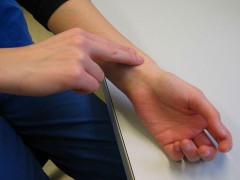
The beat in your veins that you feel at various places on the body, (the wrist is an example), is a way of measuring heart rate. Heart rate is the number of times a person’s heart beats per minute and is an indicator of how hard the heart is working.
A resting heart rate anywhere in the range of 60 - 90 is considered normal but children and babies can have faster pulses. Heart rates will fluctuate a lot, depending on factors such as activity level, as well as emotions and body weight - if you’re angry, stressed out or upset, your pulse rate is likely to be much higher than if you are calm, for example.
There are a number of medical conditions that can cause the pulse to be slow and these include malnutrition and a thyroid gland that is not functioning properly (hypothyroidism).
If you want more information on this topic, The National Emergency Medicine Association (NEMA) has a webpage with a lot of interesting detail on it.
If you are at all concerned about your pulse rate, it is best to consult your doctor, pharmacist or nurse who can use a blood pressure monitor to establish your pulse rate and rule out any possible underlying health problems you might have.